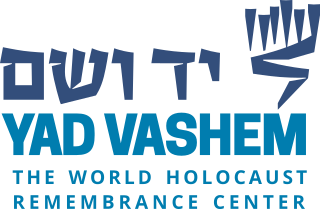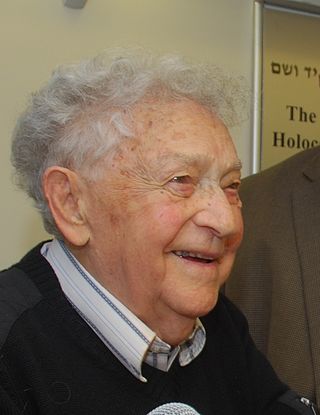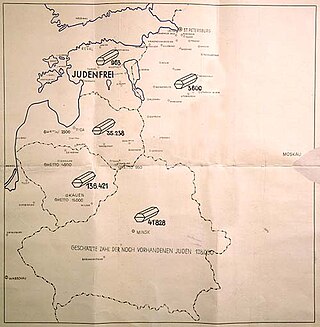Related Research Articles

Yad Vashem is Israel's official memorial to the victims of the Holocaust. It is dedicated to preserving the memory of the Jews who were murdered; echoing the stories of the survivors; honoring Jews who fought against their Nazi oppressors and gentiles who selflessly aided Jews in need; and researching the phenomenon of the Holocaust in particular and genocide in general, with the aim of avoiding such events in the future. Yad Vashem's vision, as stated on its website, is: "To lead the documentation, research, education and commemoration of the Holocaust, and to convey the chronicles of this singular Jewish and human event to every person in Israel, to the Jewish people, and to every significant and relevant audience worldwide."

Olyka is an urban-type settlement in Lutsk Raion, Volyn Oblast, western Ukraine. It is located east of Lutsk on the Putylivka Rriver. Its population is 3,032.

Yitzhak Arad was an Israeli historian, author, IDF brigadier general and Soviet partisan. He also served as Yad Vashem's director from 1972 to 1993, and specialised in the history of the Holocaust.

The Fareynikte Partizaner Organizatsye was a Jewish resistance organization based in the Vilna Ghetto in Lithuania that organized armed resistance against the Nazis during World War II. The clandestine organisation was established by communist and Zionist partisans. Their leaders were writer Abba Kovner, Josef Glazman and Yitzhak Wittenberg.

Klooga concentration camp was a Nazi forced labor subcamp of the Vaivara concentration camp complex established in September 1943 in Harju County, during World War II, in German-occupied Estonia near the village of Klooga. The Vaivara camp complex was commanded by German officers Hans Aumeier, Otto Brennais and Franz von Bodmann and consisted of 20 field camps, some of which existed only for short periods.

During World War II, Lithuania was occupied by the Soviet Union (1940–1941), Nazi Germany (1941–1944), and the Soviet Union again in 1944. Resistance during this period took many forms. Significant parts of the resistance were formed by Polish and Soviet forces, some of which fought with Lithuanian collaborators. This article presents a summary of the organizations, persons and actions involved. Lithuania was de facto independent from June 24, 1941, until June 30, 1941, when Nazi Germany took full control of the area.
Holocaust trivialization refers to any comparison or analogy that diminishes the scale and severity of the atrocities that were carried out by Nazi Germany during the Holocaust. The Wiesel Commission defined trivialization as the abusive use of comparisons with the aim of minimizing the Holocaust and banalizing its atrocities. Originally, holocaust meant a type of sacrifice that is completely burnt to ashes; starting from the late 19th century, it started to denote extensive destruction of a group, usually people or animals. The 1915 Armenian genocide was described as a "holocaust" by contemporary observers.

Emanuelis Zingeris is a Lithuanian philologist, museum director, politician, signatory of the 1990 Act of the Re-Establishment of the State of Lithuania, currently serving as a Member of the Seimas, chairman of its foreign affairs committee, Vice President of the Parliamentary Assembly of the Council of Europe and President of the Parliamentary Forum of the Community of Democracies. A Lithuanian Jew, he has been director of the Vilna Gaon Jewish State Museum, honorary chairman of Lithuania's Jewish community, and is Chairman of the International Commission for the Evaluation of the Crimes of the Nazi and Soviet Occupation Regimes in Lithuania. He is a founding signatory of the Prague Declaration on European Conscience and Communism, that proposed the establishment of the European Day of Remembrance for Victims of Stalinism and Nazism.
The Holocaust in Belarus refers to the systematic extermination of Jews living in the Byelorussian Soviet Socialist Republic during its occupation by Nazi Germany in World War II. It is estimated that roughly 800,000 Belarusian Jews were murdered during the Holocaust. However, other estimates place the number of Jews killed between 500,000 and 550,000.

The Holocaust in Ukraine was the systematic mass murder of Jews in the Reichskommissariat Ukraine, the General Government, the Crimean General Government and some areas which were located to the East of Reichskommissariat Ukraine, in the Transnistria Governorate and Bessarabia, Northern Bukovina and the Hertsa region and Carpathian Ruthenia during World War II. The listed areas are currently parts of Ukraine.

The Holocaust in Russia is the Nazi crimes during the occupation of Russia by Nazi Germany.
RollkommandoHamann was a small mobile unit that committed mass murders of Lithuanian Jews in the countryside in July–October 1941, with an estimated death toll of at least 60,000 Jews. The unit was also responsible for many murders in Latvia from July through August 1941. At the end of 1941 the destruction of Lithuanian Jewry was effectively accomplished by Hamann's unit in the countryside, by the Ypatingasis būrys in the Ponary massacre, and by the Tautinio Darbo Apsaugos Batalionas (TDA) in the Ninth Fort in Kaunas. In about six months an estimated 80% of all Lithuanian Jews were killed. The remaining few were spared for use as a labor force and concentrated in urban ghettos, mainly the Vilna and Kaunas Ghettos.
The Koniuchy massacre or the Kaniūkai massacre was a World War II massacre of civilians, mostly women and children, carried out in the village of Koniuchy on 29 January 1944 by a Soviet partisan unit together with a contingent of Jewish partisans under Soviet command. At least 38 civilians who have been identified by name were killed, and more than a dozen were injured. In addition, houses were burned and livestock was slaughtered. It was the largest atrocity committed by the Soviet partisans in present-day Lithuania.

The Genocide and Resistance Research Centre of Lithuania is a state-funded research institute in Lithuania dedicated to "the study of genocide, crimes against humanity, and war crimes in Lithuania; the study of the persecution of local residents by occupying regimes; the study of armed and unarmed resistance to occupying regimes; the initiation of the legal evaluation of the activities of the organisers and implementers of genocide; and the commemoration of freedom fighters and genocide victims." The centre was founded on 25 October 1992 by the Supreme Council of the Lithuanian Republic as the "State Genocide Research Centre of Lithuania". It is a member organisation of the Platform of European Memory and Conscience.

The Prague Declaration on European Conscience and Communism was a declaration which was initiated by the Czech government and signed on 3 June 2008 by prominent European politicians, former political prisoners and historians, among them former Czech President Václav Havel and future German President Joachim Gauck, calling for "Europe-wide condemnation of, and education about, the crimes of communism." Much of the content of the declaration reproduced demands formulated by the European People's Party in 2004, and draws heavily on the theory or conception of totalitarianism.
The Holocaust in the Soviet Union was the Nazi German and Romanian persecution of Jews, Roma and homosexuals as part of the Holocaust in World War II. It may also refer to the Holocaust in the Baltic states, annexed by the Soviet Union before the start of Operation Barbarossa.
The European Public Hearing on European Conscience and Crimes of Totalitarian Communism: 20 Years After was a European public hearing organised by the Czech Presidency of the European Union in the European Parliament on 18 March 2009. The hearing was described by the Presidency as "the third step towards the establishment of a European Platform of Memory and Conscience to support the activities of institutions engaged in reconciling with totalitarian regimes in Europe."
Shmuel Krakowski, Samuel Krakowski or Stefan Krakowski was an Israeli historian specializing in the Holocaust in Poland. After surviving the Holocaust, Krakowski worked for the intelligence and security services of the People's Republic of Poland. Later he became a Director of the Yad Vashem Archives in Israel.

Elena Kutorgienė was a Lithuanian physician who resisted the Nazi occupation of Lithuania during World War II. Kutorgienė and her son took Jewish children out of the Kovno Ghetto and placed them in gentiles' homes to save them from genocide. She is recognized as Righteous Among the Nations.
References
- ↑ Dovid Katz: The Crime of Surviving Tablet magazine, 3 May 2010.
- ↑ Lithuanian president resumes international commission to evaluate Nazi and Soviet crimes, 15min.lt, 29 August 2012